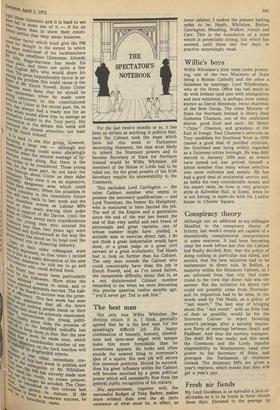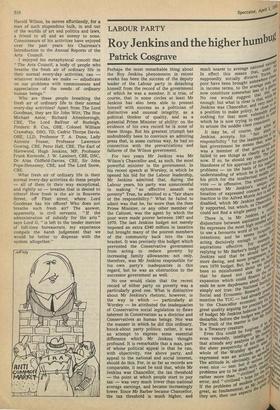THE SPECTATOR'S NOTEBOOK
For the last twelve months or so, it has been as certain as anything in politics that, once the Cabinet took the steps which have led this week to Parliament destroying Stormont, the man most likely to inherit the Stormont powers and to become Secretary of State for Northern Ireland would be Willie Whitelaw. All members of the House of Lords had to be ruled out, for the great powers of the Irish Secretary require his answerability to the Commons.
This excluded Lord Carrington — the other Cabinet member who seems to possess the necessary qualifications — and Lord Trevelyan, the former Sir Humphrey, who is rumoured to have fancied the job. The end of the Empire and a generation since the end of the war has meant the end of that very useful and rare breed of proconsuls and great captains, one of whose number might have yielded a suitable man to exercise direct rule. I do not think a great industrialist would have done, or a great judge or a great civil servant or a great ecclesiastic. Ted Heath had to look no further than his Cabinet. The only man outside the Cabinet who could conceivably have done the job is Enoch Powell, and, as I've noted before, the insuperable difficulty about that is, as a not disinterested Cabinet member remarked to me when we were discussing this precise question twelve months ago, "you'd never get Ted to ask him."
The best man
Not only was Willie Whitelaw the obvious choice. It is, I think, generally agreed that he is the best man for the appallingly difficult job. His happy combination of honesty, bravery, shrewdness and open-ness edged with temper make him more formidable than he sometimes appears. He looks and often sounds the nearest thing to everyman's idea of a squire. His new job will secure him immense publicity. Should he succeed, then his great influence within the Cabinet will become matched by a great pdlitical power which will necessarily flow from the general public recognition of his stature.
His appointment, together with the successful Budget of Tony Barber, makes more evident than ever the de facto existence of what must be, in effect, an inner cabinet. I reckon the present batting order to be: Heath, Whitelaw, Barber, Carrington, Maudling, Walker, Joseph and Carr. This is the foundation of a team which is potentially strong; but which has seemed, until these last few days, in practice surprisingly weak.
Willie's boys
Willie Whitelaw's Irish team looks promising, one of the two Ministers of State being a Roman Catholic and the other a Guinness by marriage. Lord Windlesham, who at the Home Office has had much to do with Ireland (and also with immigration and race relations), is perhaps more widely known as David Hennessy, twice chairman of the Bow Group. The other Minister of State for Northern Ireland is Henry Paul Guinness Channon, son of the celebrated diarist, good liver and snob, Sir Henry " Chips " Channon, and grandson of the Earl of Iveagh. Paul Channon's selection as Tory candidate for Southend West in 1958 caused a good deal of justified criticism, the Southend seat being widely regarded as a Guinness rotten borough. He was duly elected •in January 1959 and, as events have turned out, has proved himself a better member than many whose selection was more orthodox and seemly. He has had a good deal of ministerial service and, as befits his very considerable means and his expert taste, he lives in very gracious style at Kelvedon Hall, in Essex, when he is not having to make-do with his London house in Chester Square.
Conspiracy theory.
Although not so addicted as my colleague Skinflint to the conspiracy theory of history, last week's events are capable of a theoretically conspiratorial interpretation of some neatness. It had been becoming clear the week before last that the Cabinet had finally decided, first, that the policy of doing nothing in particular had failed, and second, that the new initiative had to be tantamount to direct rule. In Belfast, a majority within the Stormont Cabinet, so I am informed from that city, had come round to the view that direct rule was the answer. But the initiative for direct ryle could not possibly come from Stormont; and its imposition had to be seen, in the words used by Ted Heath, as a policy of "last resort." The best way of bringing about this "last resort " with as little loss of face as possible, would be for the Stormont Cabinet to reject Downing street's package, after a suitably impressive flurry of meetings between Heath and, Faulkner. And thus did matters transpire. The draft Bill was ready; and this week the Commons and the Lords transfer responsibility to Westminster, hand over power to the Secretary of State, and prorogue the Parliament of Northern Ireland. The Stormont MPs are given a year's reprieve, which means that they will get a year's pay.
Fresh air fiends
My Lord Goodman is as splendid a jack-ofall-trades as is to be found in these islands these days. Elevated to the peerage by Harold Wilson, he moves effortlessly, for a man of such stupendous bulk, in and out of the worlds of art and politics and laws, a friend to all and an enemy to none. Connoisseurs of his activities have enjoyed over the past years his Chairman's Introduction to the Annual Reports of the Arts Council.
I enjoyed his metaphysical conceit that "The Arts Council, a body of people who breathe the fresh air of ordinary life in their normal every-day activities, can — whatever mistake we make — adjudicate on our problems with commonsense and appreciation of the needs of ordinary human beings."
Who are these people breathing the fresh air of ordinary life in their normal every-day activities? Apart from The Lord Goodman, they are Sir John Witt, The Hon Michael Astor, Richard Attenborough, CBE, The Lord Balfour of Burleigh, Frederic R. Cox, OBE, Colonel William Crawshay, DSO, TD, Cedric Thorpe Davie, OBE, LLD, Professor T. A. Dunn, Lady Antonia Fraser, Professor Lawrence Gowing, CBE, Peter Hall, CBE, The Earl of Harewood, Hugh Jenkins, MP, Professor Frank Kermode, J. W. Lambert, CBE, DSC, Dr Alun Oldfield-Davies, CBE, Sir John Pope-Hennessy, CBE, and The Lord Snow, CBE.
What fresh air of ordinary life in their normal every-day activities do these people — all of them in their way exceptional, and rightly so — breathe that is denied to others? How fresh is the air in Bouverie Street, off Fleet street, where Lord Goodman has his offices? Who does not breathe such fresh air? The answer, apparently, is civil servants. "If the administration of subsidy for the arts" says Lord G, " is left to the tender mercies of full-time bureaucrats, my experience compels the harsh judgement that we would be better to dispense with the system altogether."



































 Previous page
Previous page